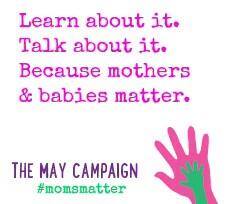Every Day Should Be Maternal Mental Health Awareness Day! What Educators Need To Know!
By: Sharon Muza, BS, LCCE, FACCE, CD/BDT(DONA), CLE | 0 Comments
 May is Maternal Mental Health Awareness month, when agencies on the local, state and federal level along with private and public organizations promote campaigns designed to increase awareness of perinatal mood disorders. While it is good to increase awareness of the symptoms, sources of help, treatment options and impact of perinatal mood disorders on parents, families and communities during the month of May, the focus really needs to be 365 days a year! Over 4 million babies are born every year in the USA. Pregnancy and birth happen every single day to women and families. Perinatal mood disorders affect women and their families every single day!Recently, the tragic death of three young children in Torrence, CA was in the news and the children's mother was arrested on suspicion of murdering her three daughters. While many details have yet to be made public, this was a new mother whose youngest child was just two months old. This woman may have been experiencing a crisis as a result of a postpartum mood or anxiety disorder (PPMAD).
May is Maternal Mental Health Awareness month, when agencies on the local, state and federal level along with private and public organizations promote campaigns designed to increase awareness of perinatal mood disorders. While it is good to increase awareness of the symptoms, sources of help, treatment options and impact of perinatal mood disorders on parents, families and communities during the month of May, the focus really needs to be 365 days a year! Over 4 million babies are born every year in the USA. Pregnancy and birth happen every single day to women and families. Perinatal mood disorders affect women and their families every single day!Recently, the tragic death of three young children in Torrence, CA was in the news and the children's mother was arrested on suspicion of murdering her three daughters. While many details have yet to be made public, this was a new mother whose youngest child was just two months old. This woman may have been experiencing a crisis as a result of a postpartum mood or anxiety disorder (PPMAD).
Take this quick ten question quiz and test your knowledge of perinatal mood disorders. Then read on to find out more and what you can do to help the families that you work with.
Take the Maternal Mental Health quiz on QuizRevolution now!
While PPMAD can affect a mother during pregnancy or the first year postpartum, there are some risk factors that may increase the likelihood of a woman experiencing this complication:
The above list is from the resource: Postpartum Progress
There is a wonderful three minute video from the 2020 Mom Project that explains more about why so many women are not receiving the help they need. This video was released by the National Coalition for Maternal Mental Health. We do not have the infrastructure in place that screens every woman or enough skilled providers who can recognize the symptoms and provide or refer to suitable treatment options.
Some typical (but not all inclusive) symptoms of Postpartum Mood and Anxiety Disorders
- Are you feeling sad or depressed?
- Do you feel more irritable or angry with those around you?
- Are you having difficulty bonding with your baby?
- Do you feel anxious or panicky?
- Are you having problems with eating or sleeping?
- Are you having upsetting thoughts that you can't get out
- of your mind?
- Do you feel as if you are "out of control" or "going crazy"?
- Do you feel like you never should have become a mother?
- Are you worried that you might hurt your baby or yourself?
list courtesy of Postpartum Support International
Childbirth educators and others who work with women during the childbearing year have a responsibility to discuss, share, educate and provide resources to all the families they work with. Ignorance is not bliss, and the more we discuss the symptoms, risk factors and resources that are available to help families in need with those we have contact with, the fewer women will suffer in silence and go without the help they need.
Resources for Women and Partners
Postpartum Progress
Postpartum Psychosis Symptoms (in Plain Mama English)
Postpartum Support International 1-800-944-4PPD
National Suicide Prevention Lifeline 1-800-273-TALK
Mother to Baby (formerly OTIS)
Medications & More During Pregnancy & Breastfeeding (866) 626-6847
Text-4-Baby Health Info Links
How do you talk about perinatal mood and anxiety disorders in your classes? What activities do you do to convey this information effectively? Do you bring up this topic again at the childbirth class reunions you attend? Can you share what works well for you so that we can all learn? What have your experiences been in helping women and their partners to be knowledgeable and informed? What do you do to be sure that every day is Maternal Mental Health Awareness Day?
Published: May 26, 2014
Tags
Postpartum depressionPregnancyChildbirth educationPostpartumPostpartum AnxietyPostpartum ProgressMaternal Mental HealthPostpartum Support InternationalMaternal depressionPPMADdepressionPSI